The discography of English singer-songwriter and former Beatle George Harrison consists of 12 studio albums, two live albums, four compilation albums, 35 singles, two video albums and four box sets. Harrison's first solo releases – the Wonderwall Music film soundtrack (1968) and Electronic Sound (1969) – were almost entirely instrumental works, issued during the last two years of the Beatles' career. Following the band's break-up in April 1970, Harrison continued to produce recordings by his fellow Apple Records acts, notably former bandmate Ringo Starr. He recorded and collaborated with a wide range of artists, including Shankar, Bob Dylan, Eric Clapton and Gary Wright.

"All Things Must Pass" is a song by English rock musician George Harrison, issued in November 1970 as the title track to his triple album of the same name. Billy Preston released the song originally – as "All Things (Must) Pass" – on his Apple Records album Encouraging Words (1970) after the Beatles had rehearsed the song in January 1969 but did not include it on their Let It Be album. The composition reflects the influence of the Band's sound and communal music-making on Harrison, after he had spent time with the group in Woodstock, New York, in late 1968. In his lyrics, Harrison drew inspiration from Timothy Leary's poem "All Things Pass", a psychedelic adaptation of the Tao Te Ching.
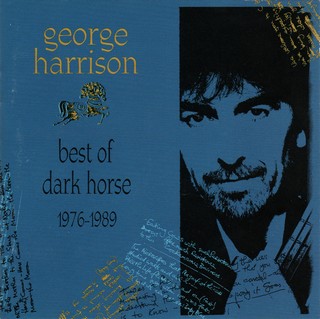
Best of Dark Horse 1976–1989 is a compilation album by the English musician George Harrison, released in October 1989. His second compilation, after the Capitol/EMI collection The Best of George Harrison (1976), it contains songs from Harrison's releases on his Dark Horse record label between 1976 and 1987. The album also includes a 1989 single, "Cheer Down", which was Harrison's contribution to the soundtrack of the film Lethal Weapon 2, and two tracks recorded specifically for the collection: "Poor Little Girl" and "Cockamamie Business". Despite the popularity of Harrison's work over this period – both as a solo artist with his Cloud Nine album (1987), and as a member of the Traveling Wilburys – the compilation failed to achieve commercial success.
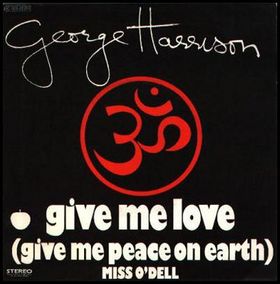
"Give Me Love (Give Me Peace on Earth)" is a song by English musician George Harrison, released as the opening track of his 1973 album Living in the Material World. It was also issued as the album's lead single, in May that year, and became Harrison's second US number 1, after "My Sweet Lord". In doing so, the song pushed Paul McCartney and Wings' "My Love" from the top of the Billboard Hot 100, marking the only occasion that two former Beatles have held the top two chart positions in America. The single also reached the top ten in Britain, Canada, Australia, and Holland.

"Dark Horse" is a song by English rock musician George Harrison and the title track to his 1974 solo album on Apple Records. The song was the album's lead single in North America, becoming a top-20 hit in the United States, but it was Harrison's first single not to chart in Britain when issued there in February 1975. The term "dark horse" had long been applied to Harrison due to his unexpected emergence as the most accomplished solo artist of the four former Beatles following the band's break-up in 1970. In the song, however, he said he used the phrase in reference to gossip about someone who carries out clandestine sexual relationships. Commentators interpret the lyrics as a rebuttal to several possible detractors: Harrison's first wife, Pattie Boyd; reviewers who criticised the spiritual content of his 1973 album Living in the Material World; and his former bandmates John Lennon and Paul McCartney. Harrison named his Dark Horse record label after the song, and his 1974 North American tour with Ravi Shankar came to be known as the Dark Horse Tour.
"Sue Me, Sue You Blues" is a song written by English musician George Harrison, released on his 1973 album Living in the Material World. Harrison initially let American guitarist Jesse Ed Davis record it for the latter's Ululu album (1972), in gratitude to Davis for his participation in the Concert for Bangladesh. When writing the song, Harrison drew inspiration from the legal issues surrounding the Beatles during the early months of 1971, particularly the lawsuit that Paul McCartney initiated in an effort to dissolve the band's business partnership, Apple Corps.
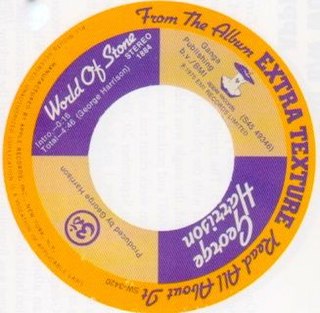
"World of Stone" is a song by English rock musician George Harrison, released in 1975 on Extra Texture , his final album for Apple Records. It was also issued as the B-side of the album's lead single, "You". Harrison wrote the song in 1973 but recorded it two years later, following the unfavourable critical reception afforded his 1974 North American tour with Ravi Shankar and the Dark Horse album. Due to its context on release, commentators view "World of Stone" as a plea from Harrison for tolerance from these detractors. According to some of his biographers, the lyrics reflect Harrison's doubts regarding his devotion to a spiritual path – an apparent crisis of faith that followed his often-unwelcome spiritual pronouncements during the tour, and which permeated his work throughout 1975.

"Teardrops" is a song by the English rock musician George Harrison from his ninth studio album Somewhere in England (1981). It was also issued as the second single off the album, in July 1981. As with the lead single, "All Those Years Ago", Harrison completed the song after Warner Bros. Records had rejected his initial submission of Somewhere in England in September 1980. In response to Warner's concerns, he wrote "Teardrops" as an attempt at a commercially oriented song.
"That's the Way It Goes" is a song by English musician George Harrison from his 1982 album Gone Troppo. Harrison wrote the song during a period when he had become uninterested in contemporary music and was enjoying success as a film producer with his company HandMade Films. Partly influenced by his extended holidays in Hawaii and Australia, the lyrics convey his dismay at the world's preoccupation with money and status, although, unlike several of Harrison's previous musical statements on the subject, he expresses resignation and acceptance.

"Deep Blue" is a song by English rock musician George Harrison that was released as the B-side to his 1971 charity single "Bangla Desh". Harrison wrote the song in 1970, midway through the recording sessions for All Things Must Pass, and recorded it in Los Angeles the following year while organising the Concert for Bangladesh. The composition was inspired by the deteriorating condition of his mother, Louise, before she succumbed to cancer in July 1970, and by Harrison's feelings of helplessness as he visited her in hospital in the north of England. Given the subject matter, "Deep Blue" also served to convey the suffering endured by the millions of refugees from war-torn Bangladesh in 1971, as sickness and disease became widespread among their makeshift camps in northern India.

"Hari's on Tour (Express)" is an instrumental by English musician George Harrison, released as the opening track of his 1974 album Dark Horse. It was also the B-side of the album's second single – which was "Ding Dong, Ding Dong" in North America and most other territories, and "Dark Horse" in Britain and some European countries. Among Harrison's post-Beatles solo releases, the track is the first of only two genuine instrumentals he released from 1970 onwards – the other being the Grammy Award-winning "Marwa Blues", from his 2002 album Brainwashed.
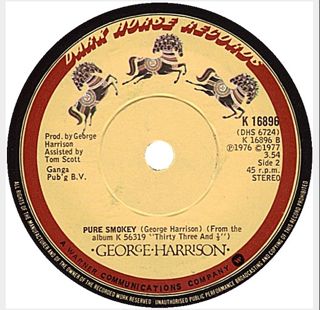
"Pure Smokey" is a song by English musician George Harrison, released in 1976 on his debut album for Dark Horse Records, Thirty Three & 1/3. The song was the second of Harrison's musical tributes to American soul singer Smokey Robinson, following "Ooh Baby " in 1975. Harrison frequently cited Robinson as one of his favourite vocalists and songwriters, and Robinson's group the Miracles had similarly influenced the Beatles during the 1960s. In the lyrics to "Pure Smokey", Harrison gives thanks for the gift of Robinson's music, while making a statement regarding the importance of expressing appreciation and gratitude, rather than forgetting to do so and later regretting it. The song title came from the name of Robinson's 1974 album Pure Smokey.
"Here Comes the Moon" is a song by English rock musician George Harrison from his 1979 album George Harrison. Harrison wrote the song while on holiday on the Hawaiian island of Maui in February 1978. His inspiration for the composition was the appearance of the moon in the evening sky, just as the sun was setting. Although the lyrics focus on this natural occurrence rather than on the symbolism it suggests, in the manner of Harrison's Beatles track "Here Comes the Sun", the song is seen as a sequel to that similarly titled piece.

"Soft Touch" is a song by English rock musician George Harrison from his 1979 album George Harrison. It was also issued as the B-side of the album's lead single, "Blow Away", in Britain and some other countries, while in markets such as North America, it was the B-side of the second single, "Love Comes to Everyone". Harrison wrote the song while in the Virgin Islands with his future wife, Olivia Arias, shortly before recording his 1976 album Thirty Three & ⅓. The song is a love song in which Harrison also conveys his wonder at the idyllic island setting.

"Save the World" is a song by English rock musician George Harrison, released as the final track of his 1981 album Somewhere in England. It was also the B-side of "Teardrops", which was the second single off the album. An environmental protest song, "Save the World" was Harrison's first composition to directly address topical issues such as the nuclear arms race, rainforest and wildlife devastation, and the ecologically irresponsible practices of corporate concerns. Musically, the song partly recalls the style of the comedy troupe Monty Python.

"Apple Scruffs" is a song by English rock musician George Harrison from his 1970 triple album All Things Must Pass. He wrote it as a tribute to the die-hard Beatles fans known as Apple scruffs, who used to wait outside the Apple Corps building and other London locations for a glimpse of the band members. This tradition continued after the group's break-up in April 1970, as the scruffs were a regular presence outside the studios where Harrison recorded his album. The song was also issued on the album's second single, as the B-side to "What Is Life".

"I Don't Care Anymore" is a song by English musician George Harrison, released as the B-side of the lead single from his 1974 album Dark Horse. The A-side was "Dark Horse" in the majority of countries internationally and "Ding Dong, Ding Dong" elsewhere, including the United Kingdom. It is one of Harrison's relatively rare compositions in the country music genre and, equally unusual among his 1970s releases, the recording is a solo performance.
"Life Itself" is a song by English musician George Harrison from his 1981 album Somewhere in England. Harrison also included it on his 1989 greatest-hits compilation Best of Dark Horse. As a love song to God, the track served as the artist's most overtly religious musical statement since 1974. The lyrics offer praise to Christ, Vishnu, Jehovah and Buddha, thereby marking a return to the concept of a universal deity, regardless of religious demarcation, that Harrison had first espoused in his 1970 hit single "My Sweet Lord".

Songs by George Harrison is a book of song lyrics and commentary by English musician George Harrison, with illustrations by New Zealand artist Keith West. It was published in February 1988, in a limited run of 2500 copies, by Genesis Publications, and included an EP of rare or previously unreleased Harrison recordings. Intended as a luxury item, each copy was hand-bound and boxed, and available only by direct order through Genesis in England. The book contains the lyrics to 60 Harrison compositions, the themes of which West represents visually with watercolour paintings. Starting in 1985, Harrison and West worked on the project for two years, during which Harrison returned to music-making with his album Cloud Nine, after focusing on film production for much of the early 1980s. The book includes a foreword by his Cloud Nine co-producer, Jeff Lynne, and a written contribution from Elton John.
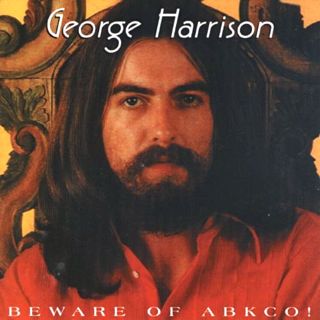
Beware of ABKCO! is a bootleg album of songs performed by the English rock musician George Harrison in May 1970. It contains songs that were under consideration for Harrison's triple album All Things Must Pass, his first release as a solo artist following the break-up of the Beatles. The performances were taped in a single session at EMI in London, on 27 May 1970, for the benefit of Harrison's co-producer, Phil Spector. Seven of the fifteen songs were subsequently recorded formally for inclusion on All Things Must Pass, as was "Everybody, Nobody" after Harrison reworked it as "Ballad of Sir Frankie Crisp ". From its 1994 release by Strawberry Records, the bootleg provided the only available record of five songs that Harrison never revisited during his career. Among these is a 1968 collaboration with Bob Dylan titled "Nowhere to Go". All fifteen songs were officially released in August 2021, as part of the Uber and Super deluxe editions of the All Things Must Pass: 50th Anniversary box set.
















